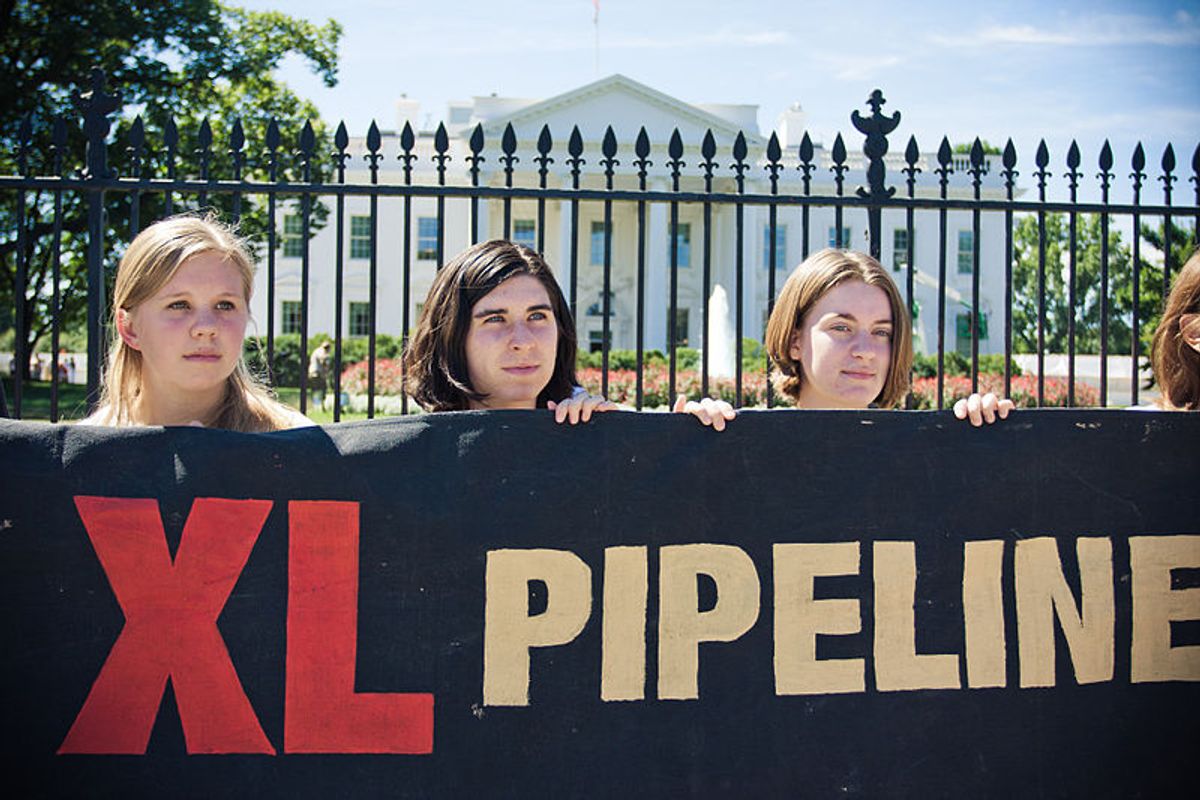 Environmentalists on Thursday were electrified by an essay by TIME national correspondent Michael Grunwald offering his support for the campaign against the Keystone XL tar sands pipeline. After suffering a week’s worth of slights from armchair quarterbacks dissing the Keystone opposition as wooly headed and un-strategic here, finally, was a member of the establishment commentariat saying the recent protests in Washington were spot-on.
Environmentalists on Thursday were electrified by an essay by TIME national correspondent Michael Grunwald offering his support for the campaign against the Keystone XL tar sands pipeline. After suffering a week’s worth of slights from armchair quarterbacks dissing the Keystone opposition as wooly headed and un-strategic here, finally, was a member of the establishment commentariat saying the recent protests in Washington were spot-on.
In an essay titled, “I’m with the tree huggers,” Grunwald wrote:
“Now is the time to choose sides. It’s always easy to quibble with the politics of radical protest: Did ACT UP need to be so obnoxious? Didn’t the tax evasion optics of the Boston Tea Party muddle the anti-imperial message? But if we’re in a war to stop global warming — a war TIME declared on a green-bordered cover five years ago — then we need to fight it on the beaches, the landing zones and the carbon-spewing tar sands of Alberta. If we’re serious about reducing atmospheric carbon below 350 parts per million, we need to start leaving some carbon in the ground.”
I was as pleased as everyone else in green circles with Grunwald’s opinion. His well-argued defense of the Forward on Climate rally and the Keystone XL campaign was bracing.
And yet … Something about the essay bothered me. It took me a good part of the day, but I finally figured out what it was: Grunwald’s insistent — one could say obsessive — efforts to align himself with “respectable” opinion.
The essay is a scant 755 words long. The word “respectable” appears no less than four times in the piece. Grunwald wields the word like a talisman, as if to say, “I might agree with those people in the streets, but trust me, I’m still a Very Serious Person.”
There’s a real problem here: the assumption, expressed through Grunwald’s defensiveness, that the environmental movement is somehow not respectable.
Despite sometimes over-the-top efforts to appear (and appeal to) the mainstream, environmentalists seems stuck with outdated stereotypes. You know what I’m talking about: Unshaved, sandal-wearing, granola-muching weirdos. Different in their look and their concerns from “ordinary Americans,” however mythical those people might be. “The unkempt riffraff,” as Grunwald puts it, somewhat self mockingly.*
This evidently unshakable stereotype is partly a cultural hangover from the seventies. A lot of people of a certain age hear “environmentalist” and they immediately conjure the feckless back-to-the-land hippies of Easy Rider. Partly it’s an association with the EarthFirsters who often make the news through the outlandishness of their tactics; God love ‘em, but the dreadlocked, steam punk aesthetic of your typical blockader is a little less than what most folks would call respectable. And partly it’s true: environmentalists, wary of the consumerist mindset of American society, do carry a bit of a counterculture vibe.
But here’s the thing that Grunwald and wannabe Very Serious People need to remember: The vast majority of environmentalists are just like them — hard-working Americans who want a livable planet for their families.
Take a look at some of the leaders of the environmental movement. Perhaps the best known Keystone pipeline opponent is Bill McKibben. Former editor of the Harvard Crimson, former New Yorker staff writer, Methodist Sunday school teacher — the man is the very model of East Coast Establishment. McKibben’s top science advisor is James Hansen, a scientist at NASA, a pretty respectable organization. Sierra Club executive director Michael Brune is a balding father of three who wears V-neck sweaters. EDF head Fred Krupp could be a poster boy for Rockefeller Republicanism.
And take a look at the rank and file. I reported on the Forward on Climate rally, and the crowd was nothing less than ordinary — distinguished only by their passion for protecting the planet. Yes, there was a guy dancing around in some kind of bald eagle costume. But there was also a group of eight women carrying a banner reading, “Texas Baptists for Clean Energy”; the reverse side read, “The Earth is the Lord’s — Not TransCanada’s.” I marched for a minute with a group of 250 people who had traveled by bus and train from Minnesota. Among them was Beth Mercer-Taylor, a city councilmember from the town of Falcon Heights, and a group of 20 students from the University of Minnesota. The whole group looked like they could have been extras in a Garrison Keillor production; awfully respectable looking.
Don’t get me wrong — I think Grunwald’s support for the protesters is great. In any political fight, you need all the friends you can get, and having an influential (and “reasonably kempt”) ally like Grunwald is invaluable.
But environmentalists should remember that they don’t need any self-appointed serious person to confer respectability upon them. Their respectability is inherent: It comes from the moral fight they are waging to ensure that we leave to the next generation a planet as healthy as the one we inherited.
* It’s worth wondering if Grunwald would feel the same need to repeatedly appeal to respectable opinion if he were writing about the Supreme Court’s hearing of California’s Proposition 8. We’ve come a long way — and of course I celebrate this — when it’s more respectable to be gay than it is to be green.

Shares